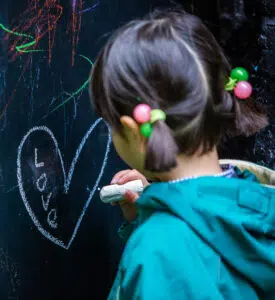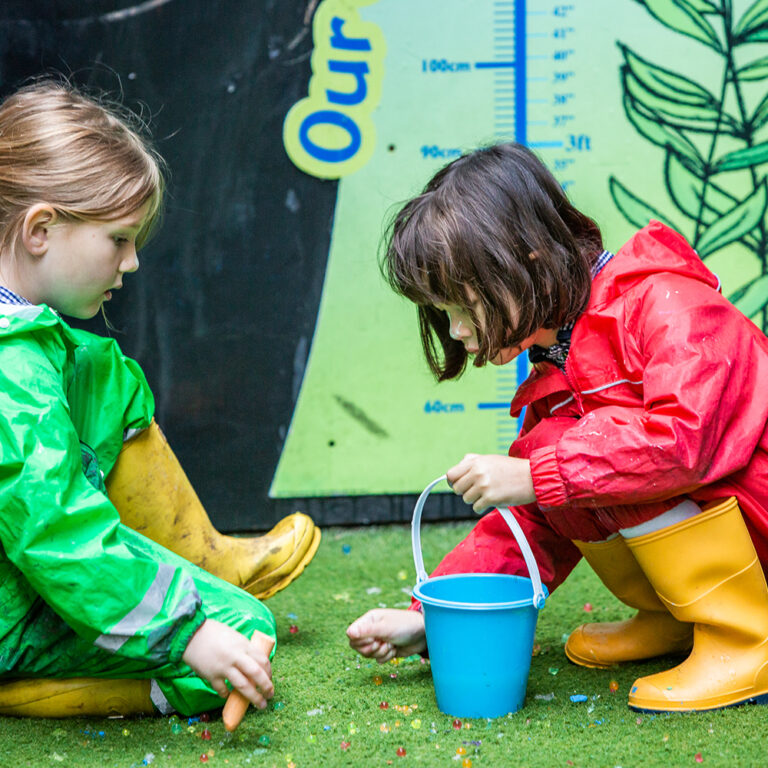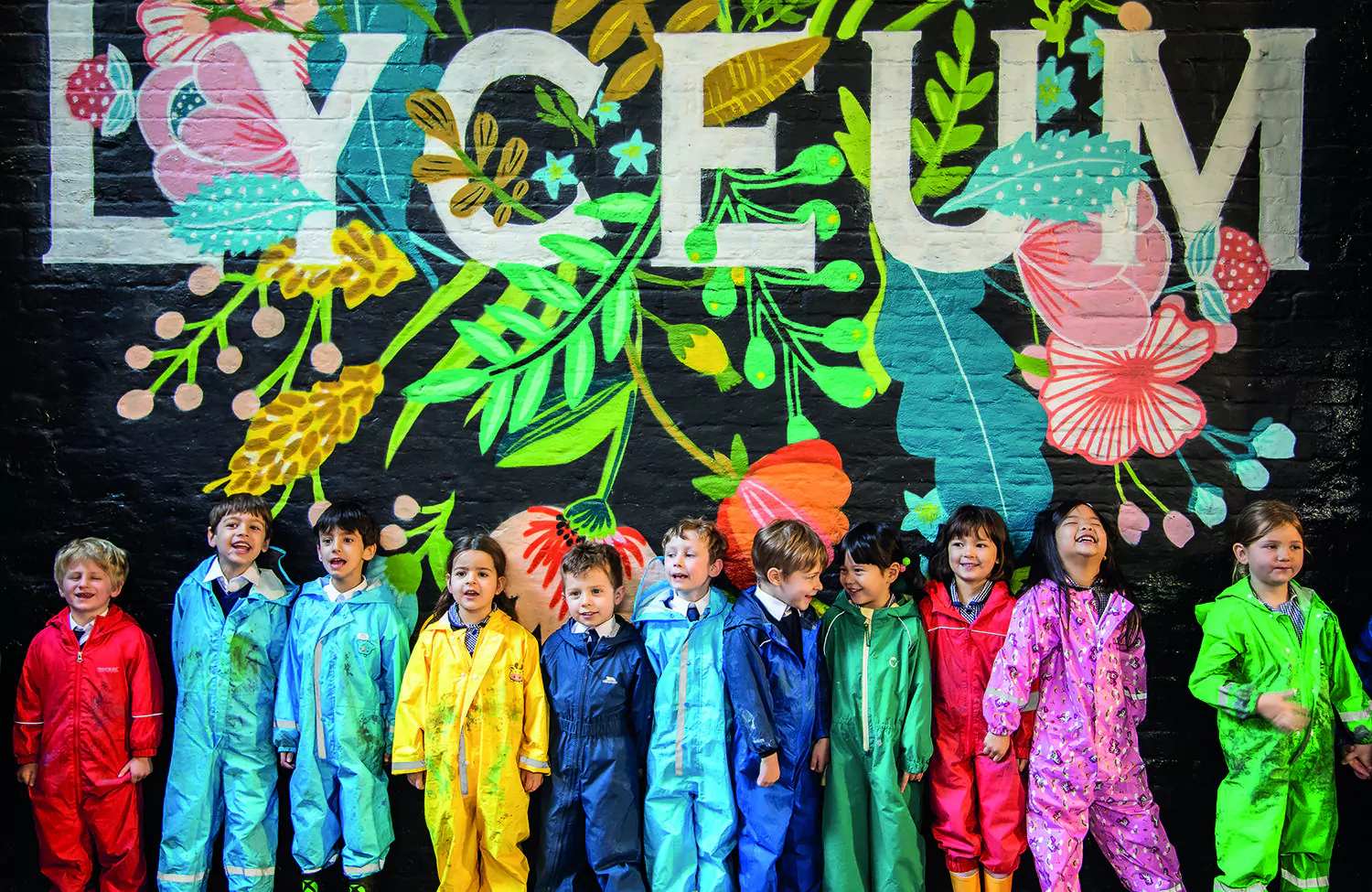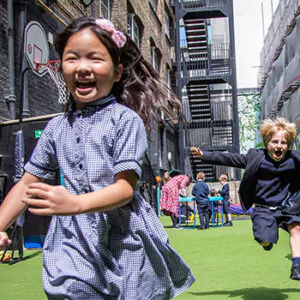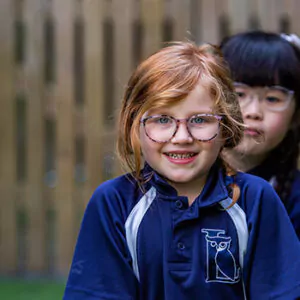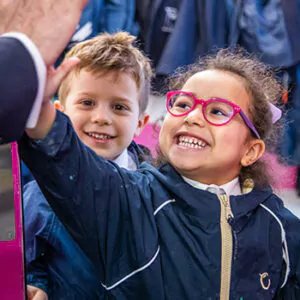First Days
Teaching staff are on hand each day at drop-off time to greet the Reception classes and their parents; this ensures a smooth transition into school as any messages from home can be passed straight onto the team. Collection time also gives you a chance to catch up with the teaching staff, and if you feel you need more time to chat, you can always ask to arrange a ‘touch base’ meeting with them at any time. We understand that starting ‘proper school’ can at first be quite an emotional experience, both for you and your child, and we will be on hand to reassure and provide comfort when it is needed.
Very swiftly, you will find that your child has settled into the new routines and is coming into school happily. Once they are, we would ask you to help them to develop their independent skills. Reception children, for instance, are encouraged to take ownership of their belongings. They are expected to carry their own school bags into class and soon learn to unpack them and hang up their coats and hats. Gradually they learn what to bring in each day, such as their homework pack or their musical instrument, and they remember when to wear their PE Kit or full uniform.
Child-Initiated Play
Play-based education is at the heart of all we do and, although the children are learning at a very swift rate, they are not aware that they are doing so. Imaginative and creative lessons ensure key skills are gained but without any sense of pressure. When learning is enjoyable, a natural thirst for it is developed; there is not the usual separation between work and play.
In Reception, children have a slightly more structured day than they would have had in Nursery. They have three morning lessons, with a play/snack after lesson one. These are followed by lunch and playtime. In the afternoon there will be a topic-based lesson and structured play, or a park visit. The curriculum is enriched with weekly Spanish, Music PE/Dance and Yoga lessons.
Our dedicated team quickly learn about the interests and needs of each individual child and they cater for their next steps accordingly. We do not formally group or label children, but we do provide a subtly differentiated curriculum, extending children as and when they are ready for a challenge.
Literacy
Literacy encompasses the skills needed to communicate and understand ideas through reading and writing. In Reception, we generally refer to this area of the curriculum as ‘Phonics’. Phonics is a systematic approach to teaching early reading skills and simply means matching letter symbols to their corresponding sounds.
Initially, children are taught the most common sound made by alphabetic letters on their own. Rather than teaching from a-z, letter sounds are introduced in an order which allows children to combine them and begin to explore and read short words. For example, the first six letters and sounds in our Phonics scheme are s,a,t,p,i,n. We then explore what happens when some of these letters join to form words, of which there are 106! The most commonly used letters in short words are then drip fed until children have a basic understanding of the phonetic alphabet.
When ready, children are then introduced to the language and understanding of di/trigraphs. Digraphs are when two letters join together and make a new sound e.g. ch, sh, oa. Trigraphs are when three letters join together to make a new sound e.g. igh.
In Reception, we encourage children to write using the sounds they know. Phonics lessons continue across Key Stage 1, allowing children to understand and learn spelling rules for more complex words.
Alongside our Phonics Scheme, we do introduce “tricky words” which are the most common unphonetic words in our vocabulary. These are taught discretely to ensure children can access reading books and use them in their own writing. This includes words such as “the” and “was”.
Workshops for parents are provided in both Phonics, early Maths and Parenting, and support is provided to parents regularly throughout the year to help you better understand the teaching of Phonics and how to support your child as they begin to read and write.
Numeracy
We pride ourselves in the fact that our pupils enjoy Numeracy at The Lyceum. By the end of Reception, children are not only able to find answers, but they can explain their process and prove their logic. We steadily build across the year from number recognition to addition, subtraction, halving, doubling and solving problems. We embed correct mathematical language from the beginning and ensure children are aware of mathematics in the wider world, preparing them for “Singapore Maths No Problem” which is introduced from Year One. We also focus on shape, position and movement, time and measurement.
Mealtimes
Snack and lunchtime are both supervised by members of the EYFS team and we closely monitor the eating habits of all children to ensure that they have a balanced diet. At snack-time, the children eat at our outdoor snack tables after their morning play. At lunchtime, all children eat in our lovely canteen and individual dietary requirements/allergies are catered for. Children are provided with a range of healthy meals and regularly enjoyed themed meals in relation to their learning.
EYFS children need to come to school with two healthy snack portions, one for the morning and one for the afternoon. Fruit is encouraged for the morning snack. We ask that grapes are cut in half for safety reasons. We suggest afternoon snacks to be cheese and crackers or rice cakes etc. Sweets/chocolate/crisps are not permitted and all snacks must be completely nut free.
Outdoor Learning
In Reception we regularly use the fantastic location of the school to enhance our learning, by going on trips which are walking distance to the school such as the local fire station, art galleries and parks.
We also have our very own “Lyceum Garden” at Spitalfields City Farm, where we grow our own plants, fruit and vegetables and help take care of the animals. We have regular visitors to the school who lead workshops and answer questions from the children, such as local police officers and adults in industries linked to our class topics.
Emotional Wellbeing
As a school, we are proud of our calm, happy atmosphere which is felt by all as they enter the building. In EYFS, ensuring children are kind, happy, and feel safe is at the heart of everything we do. We ensure all children are given the chance to share how they are feeling at the beginning of each day, and each class has a ‘visual feelings chart’ on the wall to allow children to indicate how they are feeling throughout the day. Regular Circle Time lessons take place, exploring all aspects of personal, social and emotional development (PSED) and assemblies also often link to wellbeing. Children are supported by the dedicated team to navigate any emotional obstacles they face and are encouraged to have a ‘growth mindset’ when it comes to problem solving.
